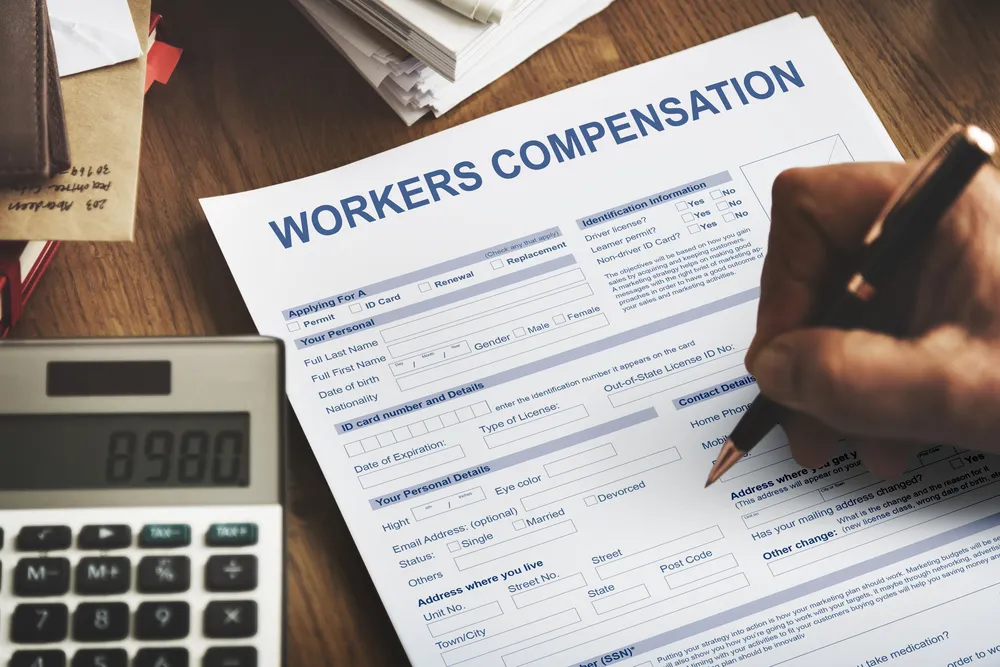 Menu Call Today504.838.8883 Close Back
Menu Call Today504.838.8883 Close Back- Home›
- About US›
- Workers’ Comp›
- Column1›
- Column 2›
- Work Injuries›
- Workers We Represent›
- How does workers’ compensation work?›
- FAQs›
- What to do if I’m hurt at work?›
- How to File a Workers’ Comp Claim›
- When should I hire a Louisiana workers’ compensation lawyer?›
- What will my workers’ comp benefits cover?›
- How long does it take to get workers’ comp benefits?›
- How much will my workers’ comp benefits pay?›
- Can I pick a workers’ comp doctor?›
- Can I collect Social Security disability benefits while receiving workers’ comp benefits?›
- Should I take a lump sum workers’ comp settlement?›
- Can I Change Jobs While on Workers’ Comp in Louisiana?›
- Longshore & Harbor›
- Social Security Disability›
- Areas We Serve›
- Blog›
- Contact›

How Long Can You Collect Workers’ Compensation?
Workers’ compensation is a vital safety net designed to protect employees who suffer job-related injuries or illnesses. This system ensures that workers receive medical care and compensation for lost wages when they are unable to perform their duties due to workplace accidents or health issues.
Understanding workers’ compensation is crucial because it not only provides immediate financial relief but also helps maintain stability for employees during challenging times.
o, the important question: How long can you collect workers’ compensation? The duration of these benefits can significantly affect your recovery and financial planning. Understanding workers’ compensation laws can be complex. It’s important to have a clear understanding to get the most support possible.
Whether you are a recent claimant or just seeking to inform yourself about potential future needs, this guide will provide essential insights into how long these benefits may last, helping you plan effectively for the future.
What is Workers’ Compensation?
Workers’ compensation is an insurance program mandated by the government that provides compensation to employees who suffer job-related injuries and illnesses. This system gives benefits to employees for their injury, no matter who caused it.
The main goal is simple: to quickly and efficiently help injured workers, creating a safer and fairer workplace.
- It provides a safety net of medical benefits and wage replacement, ensuring that you do not face financial ruin because of injuries incurred at work.
- It offers rehabilitation services to help you return to work, maintaining your skills and career progress.
Overview of Workers’ Compensation Benefits
Workers’ compensation provides different benefits to help you get the support you need while recovering from a workplace injury. The primary categories of benefits include:
Medical Care
This covers all necessary medical treatments related to the work injury, including hospital visits, medications, surgeries, and necessary medical equipment. The aim is to fully restore the health of the injured employee, or at least to improve their condition as much as possible.
Rehabilitation Expenses
Rehabilitation benefits are crucial for helping injured workers regain their ability to return to work. This can involve therapy and training to help a worker change careers if needed because of an injury.
- Disability Payments: These payments compensate for wages lost while a worker is unable to work. Disability benefits are typically categorized into four types:
- Temporary Total Disability: Provided when the worker is completely unable to work for a limited period.
- Temporary Partial Disability: Offered when the worker can perform some, but not all, of their job duties during recovery.
- Permanent Total Disability: Granted when the injury permanently prevents the worker from returning to any kind of gainful employment.
- Permanent Partial Disability: Applies when the injury permanently reduces the worker’s capability to work, though they can still perform some work duties.
2. Death Benefits: In the unfortunate event of a worker’s death due to a job-related injury, workers’ compensation provides benefits to the dependents or survivors, typically covering funeral expenses and providing financial support.
Eligibility Criteria for Receiving Benefits
To qualify for workers’ compensation benefits, you must meet several criteria:
- You must be an employee of the company providing the insurance.
- The injury or illness must be work-related, occurring as a direct result of employment activities or conditions.
- You must file the claim within the deadlines set by Louisiana state laws. To comply with Louisiana state laws, you must file your claim within the specified deadlines. These deadlines generally require you to promptly report the injury to your employer. You have one year from the date of the injury or the date you became aware of a work-related illness to file the claim. It is essential to inform your employer in writing as soon as possible after the injury occurs, although the official filing can be done within the one-year period.
How Benefits Support Injured Workers
Workers’ compensation benefits are designed to ensure that you can focus on recovery without the stress of financial hardship. Here’s how:
- Financial Stability: Disability and lost wage payments help replace lost income, providing financial stability when you are unable to work due to your injury.
- Comprehensive Medical Care: Coverage of medical expenses means you don’t get medical debt.
- Career Continuity or Transition: Rehabilitation and vocational training services help you either return to your previous job or transition to new employment if you are unable to perform your former job duties.
Workers’ compensation provides important benefits to protect workers and their families from the harmful effects of workplace injuries. This system helps employees recover and get financial support.
Duration of Workers’ Compensation Benefits in Louisiana
In Louisiana, there are a few different things that factor into how long your benefits last. Workers’ compensation aims to help you recover from the injury you received at work. Because of that, the duration is dependent on the severity of your injury and it is highly individual. But there are a few rules that can help you figure out how long your benefits might last.
Remember, for the most accurate answer, you should speak with an attorney who can evaluate your case.
General Rules about Duration
In Louisiana, the duration of workers’ compensation benefits is primarily determined by the type of disability you experience:
- Medical Benefits: These can continue indefinitely as long as they are deemed necessary and related to the work injury.
- Indemnity Benefits: These payments for lost wages may have specific limits based on how severe the injury is and how long recovery takes. Questions about whether you qualify for indemnity benefits? Contact our attorneys today.
Temporary vs. Permanent Disability Benefits
The distinction between temporary and permanent disability benefits significantly impacts the duration of benefit payments.
- Temporary Disability Benefits (both total and partial) are provided to workers who are expected to recover and return to work. In Louisiana, workers receive temporary total disability benefits until they can go back to work.
- Supplemental Earnings Benefits are paid when a worker is unable to earn 90% or more of their pre-accident wages due to an injury. It covers the wage difference between what they used to earn before the injury and what they can earn now.
- Permanent Disability Benefits come into play when an injury results in irreversible impairment. These benefits are categorized further into:
- Permanent Partial Disability (PPD) occurs when a worker has permanent impairment to a specific body part listen in the workers’ compensation laws. As a result, they may be eligible to receive PPD benefits. The duration depends on a pre-determined schedule that specifies benefit length according to the body part injured and percentage impairment.
- Permanent Total Disability (PTD): This is paid when an individual cannot return to any gainful employment. In Louisiana, PTD benefits may continue indefinitely, providing a lifelong benefit to those who qualify.
Permanent Total Disability (PTD) Benefits
Permanent Total Disability (PTD) benefits are designed to support workers who have sustained injuries or illnesses so severe that they are unable to return to any form of gainful employment. These benefits ensure long-term financial stability for those who are most affected by workplace accidents.
Definition and Explanation of PTD Benefits
PTD benefits are typically granted when your injuries are so significant that they permanently prevent you from performing any work-related activities. This level of disability does not just imply a severe limitation in work capacity but a complete inability to earn an income in any job reasonably suited to their education, training, and experience.
Criteria for Receiving PTD Benefits
To qualify for PTD benefits, you must meet strict criteria, which generally include:
- Comprehensive medical evaluation documenting the extent of the injuries and confirming that they are permanent and total.
- Evidence that the injuries prevent you from performing any substantial gainful activity.
- Verification that the condition is not expected to improve significantly over time, substantiated by medical prognoses.
Duration and Circumstances Under Which PTD Benefits End
In Louisiana, PTD benefits can last forever as long as your disability doesn’t improve. However, several circumstances can alter this status:
- Medical Improvement: If new treatments or medical advancements improve your condition, your benefits may be adjusted or stopped after a reevaluation.
- Employment: If you somehow become able to engage in gainful employment, even if in a different field or capacity than before the injury, PTD benefits may be reevaluated or discontinued.
PTD benefits are closely monitored to make sure they go to those who truly need them. If a worker’s condition gets better, adjustments can be made. This balance helps keep the workers’ compensation system strong and reliable for those who need it.
Challenges and Considerations in Collecting Workers’ Compensation
Navigating the workers’ compensation system can often be complex and challenging. Understanding the common hurdles, legal nuances, and strategic approaches can significantly enhance the efficiency and success of claims. Having an attorney on your side through this can be extremely helpful.
Common Challenges Faced by Claimants
- Delays: Processing claims can take time, and delays are common. These may stem from the documentation requirements, the need for detailed medical evaluations, or administrative backlogs. Delays can be particularly stressful when you’re relying on these benefits for medical care and daily expenses.
- Disputes: Claimants often have disagreements with insurance companies or employers. These disagreements can be about the validity of claims, the extent of injuries, or the benefits provided. Such disputes may result in reducing, delaying, or denying claims.
- Complexity of Claims: Workers’ compensation rules can be confusing for many people. Knowing which injuries are covered or how benefits are calculated is information that is difficult to find and understand.
Legal Considerations and the Role of Workers’ Compensation Lawyers
Workers’ compensation lawyers like us play a crucial role in addressing these challenges. We help navigate the legal intricacies of workers’ compensation laws and advocate on your behalf to ensure fair treatment.
Having legal knowledge is crucial in cases involving serious injuries. It is also important when long-term benefits such as PTD are at stake. Additionally, you need legal expertise when claims are denied.
Tips for Navigating the System and Ensuring Maximum Benefits
- Documentation: Maintain thorough documentation of all medical treatments, communications with employers, and interactions with the insurance company. Proper records can be crucial in disputes or appeals.
- Understand Your Rights: Being well-informed about your rights under workers’ compensation laws can empower you to advocate effectively for yourself. Understand the benefits you are entitled to and the processes involved in claiming them.
- Seek Professional Advice: Consulting with a workers’ compensation lawyer can provide invaluable guidance and support, especially in complex cases. We can help manage the paperwork, represent you in hearings, and negotiate with insurers or employers.
- Act Promptly: Timing is critical in workers’ compensation claims. Report injuries to your employer in writing right away, get medical help quickly, and file your claim on time to avoid delays or denials.
By understanding these challenges and considerations, you can better navigate the system, reducing the stress and uncertainty often associated with workers’ compensation claims. This proactive approach helps secure benefits efficiently and supports a smoother recovery and return to work.
I Want My Free Consultation

Serving Workers
CALL US »Metairie OFFICE
Hours:
Monday - Friday
8AM - 5PM





